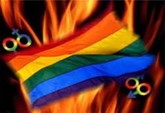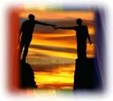
Early Americans going back to the time of the colonists place strong emphasis on family life and procreation. Anybody engaging in homosexual acts was seen as running counter to these efforts.
The laws of the United States were based on the Judeo-Christian bible. There are five passages in the bible that helped to form our laws and options about gay people. Those statements have hurt homosexuals in the United States in major areas of their lives; in the act of love making love, in marriage, in publications, in the clergy and in the armed forces.
The Virginia Colony passed the first known anti-sodomy law in America in 1610. Under this law, the practice of sodomy was punishable by death. While all of the colonies passed laws against sodomy, the records of prosecutions of such acts are scant. The Puritans of New England condemned sodomy, whether it was heterosexual or homosexual. Homosexuality was not condoned because the act did not result in the production of offspring and it went against their religious beliefs. The Massachusetts Bay Colony used the Old Testament of the Bible when enacting legislation on homosexual activity. It included in its 1641 law the passage from Leviticus, which states “[if] any man lieth with mankind as he lieth with a woman, both of them have committed abomination, they both shall surely be put to death.” (Lev 20:13)

What the Bible says about Homosexuals
“You shall not lie with a male as with a woman: it is an abomination” (Lev 18:22).
“God gave them up to degrading passions. Their women exchanged natural intercourse for unnatural, and in the same way also the men, giving up natural intercourse with women, were consumed with passion for one another. Men committed shameless acts with men and received in their own persons the due penalty for their error” (Rom 1:26-27)
“Do you not know that wrongdoers will not inherit the kingdom of God? Do not be deceived! Fornicators, idolaters, adulterers, male prostitutes, sodomites, thieves, the greedy, drunkards, revilers, robbers – none of these will inherit the kingdom of God” (1 Cor 6:9-10).
The condemnation of the law applies for those “who kill their father or mother, for murderers, fornicators, sodomites, slave traders, liars, perjurers. (1 Tim 1:9-10).
Because men were seen by religious leaders as the head of households in colonial times, lesbian women were punished less severely than homosexual men. In 1655, the New Haven Colony became the only colony to enact a law that widened the definition of sodomy to include sexual acts between women, but the law was repealed after the Colony became part of the Connecticut Colony.
However, although nobody was put to death after that period, the act of sodomy was still punishable by law. In 1986, the Supreme Court upheld the constitutionality of Sodomy laws in Bowers v. Hardwick. As a result of that upheld law, fourteen states that were still able to punish homosexuals and heterosexuals. However, it was rare that heterosexuals were prosecuted under sodomy laws.
It was not until 2003 in the case of Lawrence v. Texas that the Supreme Court reversed their decision, invalidating sodomy laws that remain in the fourteen states of Virginia, Utah, Texas, South Carolina, Oklahoma, North Carolina, Idaho, Florida and Alabama.
There has been a culture war in the United States. In 1860, the poet Walt Whitman published the third edition of Leaves of Grass, which added the Calamus group of poems. The new section had a strong homoerotic theme and celebrated the ‘love of comrades’ and ‘manly love.’

Yet, nearly one-hundred years later, a small group of persons associated with the Mattachine Society began publishing ONE in 1953. Unlike other publications, it was outspoken for its day. It aspired to expose police harassment and entrapment practices as well as defend homosexuals. One year later, the Postmaster General, after receiving complaints from religious groups, declared ONE obscene and seized copies of the magazine. If sex or even the talk of it was between a man and women, according to the Bible, then it was considered offensive to God. As a result, publishers of gay-themed literature were forced to halt most publications. Or they simply did not endeavor to begin publishing gay-related literature.
The publishers of ONE filed a lawsuit. In 1958, the Supreme Court heard the case of ONE v. Olesen. The Court ruled in favor of ONE. It was the first Supreme Court case that directly affected homosexuality. Several years later in 1962, the case of Manual v. Day, the Supreme Court again in favor of a homophile publication, it was in fact, one of the very first homoerotic publications.
Today there are national and regional gay newspapers and magazines. A direct impact of these publications was that some of these newspapers ‘outed’ (letting the public be aware that a person was gay) politicians who were against homosexuals. The free press, protected by the US constitution, was now contributing to help with check and balances of political figures that were hypocritical at times.
Since gays are considered sinners in the eyes of the church, they cannot serve as leaders in churches or temples. If they were a leader of a religious house, and if they were found out to be gay, they lost their position and were excommunicated from their house of worship as well.
Many religious supporters disagree that homosexuality is a sin in the eyes of God, including those that fought for the inauguration of the Episcopal Church’s first Openly Gay Bishop V. Gene Robinson, a decision that divided the church but promoted a more progressive religious community.
There are many scholars of religion who believe that the intent of references to homosexuality in the Bible may not relate to same-sex relations at all. Professor of Biblical Interpretation at Auburn Theological Seminary, Walter Wink, describes in his presentation on Homosexuality and the Bible:
“Some passages that have been advanced as pertinent to the issue of homosexuality are, in fact, irrelevant. One is the attempted gang rape in Sodom (Gen. 19:1-29), since that was a case of ostensibly heterosexual males’ intent on humiliating strangers by treating them “like women,” thus de-masculinizing them. (This is also the case in a similar account in Judges 19-21.) Their brutal behavior has nothing to do with the problem of whether genuine love expressed between consenting adults of the same sex is legitimate or not. Likewise Deut. 23:17-18 must be pruned from the list, since it most likely refers to a heterosexual prostitute involved in Canaanite fertility rites that have infiltrated Jewish worship; the King James Version inaccurately labeled him a ‘sodomite.’”
As a result of ‘enlightened’ places of worship, there are a few places of worship who allow gay leaders; Jewish (Reform) Synagogues ,the United Church of Christ, the Unitarian Universal Church, and in October 2011, the first gay minster was ordained by the US Presbyterian church.
Scott Anderson, was forced to leave his church 20 years earlier because a couple had threatened to tell the parish that he was gay. So he told the parish himself and left the church. Because the church changed their doctrine in 2010 to allow for openly gay minsters to serve, Scott is now serving at the Covenant Presbyterian Church in Milwaukee.
Today, however, most places of worship still do not allow gay clergy to serve. The following churches still do not recognize gay ministers; Assembly of God, Baptist, Catholic, Jewish (Conservative and Orthodox), Lutheran, Methodist and Muslims, to name a few.
One-hundred, fifty, or even twenty-five years ago gay marriage was not in the national consciousness as being a viable goal. Gay people could, in many jurisdictions across the US, have a civil union. These unions recognized that these two people were bound by some legal rights; however, they did not have all the legal rights of married couples. The recognition of such marriages is a civil rights, political, social, moral, and religious issue. And, important in some gay’s views, they wanted to be bound by ‘God.’ Many gay people were raised religiously and they wanted to get their churches blessings or any churches blessings, before God.
The Sacrament of Marriage (“Matrimony”) is defined first in the Book of Genesis, then later in the teachings of Christ as a union of man and woman. Therefore, most houses of worship do not want the word ‘married’ associated with gay people. As far as the law is considered, the word married v. civil union is a semantic problem in many ways. However, most churches will not perform gay marriage ceremonies. Those include: the Assembly of God, Baptist, Catholic, Jewish (Conservative and Orthodox), Lutheran, Methodist and Muslim.
While eight states recognize gay marriage, it is not federally recognized. So for most gays living in the majority of the states in America, they are not allowed to marry. For those who live in states that allow for same-sex marriage, many still cannot get their churches to marry them, or to recognize them as being married.
However, in recent years some places of worship have chosen to perform and recognize gay married such as; Jewish (Reform) and the United Church of Christ. The General Convention of the Episcopal Church in the United States of America adopted a resolution allowing individual bishops to choose whether or not to allow the blessing of same-sex unions within their bishoprics.
Interesting enough, Native American’s historically accepted same-sex relationships. However, in the colonial era, the influence of Europeans changed that. In late 2008, the Coquille Indian Tribe in Oregon was the first Native America tribe to once again, extend full tribal benefits to any married couples, including homosexuals. The Native Americans also respect homosexuals as prophets. Homosexuals are called, “Two Spirit.”
In 1950 after a State Department official, John Peurioy, testified to Congress about the frequency of homosexuality among those dismissed from government, the Senate launched an investigation. The subsequent report, “Employment of Homosexuals and Other Sex Perverts in Government,” argued for the dismissal of all homosexuals in the federal government. Since according to the Bible, gay sex was considered sinning, Mr. Peurioy used that as pretext to target gays.
The report also recommended that state as well as the military increase their persecution of homosexuals. As a result, men and women in the military were targeted for dismissals in the armed services. Even though in Ancient Greece as far back as 378 B.C.E., the Theban general Gorgidas formed the Scared Band of Thebes, a military unit several hundred strong that was composed entirely of male lovers. The unit soon became renowned for its valor in battle.
At the same time as the military began to kick out service people because of their homosexuality, the American Psychiatric Association (APA) listed homosexuality as a sociopathic personality disturbance in its first edition of “The Diagnostic and Statistical Manual, Mental Disorders.” However, in 1956, a psychologist Evelyn Hooker published an influential paper which argued that homosexuality was neither a cause nor a manifestation of pathology. Her work promoted the second edition of DSM published in 1968 to change the category of homosexuality to non-psychotic mental disorders. And in 1973, the board of trustees of the APA revisited the issue and this time they voted to strike the listing of homosexuality as a mental disease. At the same time, it created a new category for those who felt ashamed by or wanted to change their sexual orientation. Since America began to place value on science over religion in some circumstances, this was an important step forward for gays.
Yet, even in colonial times, homosexual service personnel were targeted. One of America’s unsung military hero’s was Filbert du Motier, marquis de Lafayette. He was one of the best-known generals in the American Revolutionary War. He was also gay. So it was ironic that the military two-hundred plus years later still would discharge gay people in the military. One of the first gay soldiers to be discharged from the US military was Lieutenant Enslin in 1778.
Since then, if military personnel admitted to being gay or if the military brass had enough evidence to support their accusations against a person they thought was gay, they were removed from military services.
As for the U.S. Armed Forces, the Court of Appeals for the Armed Forces has ruled that the Lawrence v. Texas decision applies to Article 125, severely narrowing the previous ban on sodomy. In both United States v. Stirewalt and United States v. Marcum, the court ruled that the “conduct [consensual sodomy] falls within the liberty interest identified by the Supreme Court,” but went on to say that despite the application of Lawrence to the military, Article 125 can still be upheld in cases where there are “factors unique to the military environment” that would place the conduct “outside any protected liberty interest recognized in Lawrence. Examples of such factors include rape, fraternization, public sexual behavior, or any other factors that would adversely affect good order and discipline. Convictions for consensual sodomy have been overturned in military courts under Lawrence in both United States v. Meno and United States v. Bullock.
In December 1993, under orders from President Clinton, the laws became less intrusive against gay military members. President Clinton helped to enact, DADT (Don’t Ask, Don’t Tell). The policy prohibited military personnel from discriminating against or harassing closeted bisexual or homosexual service members or applicants. However, if a person was caught having homosexual sex or if they admitted to being gay, they could be discharged.
In September 2011, under President Barak Obama administration, DADT was officially repealed. Today, gay people can serve openly in the military.
While gay sex, gay literature, gay church leaders, gay marriage, and gays serving in the military are now some rights homosexuals can take solace in, there are still religious opposition in those areas as well as discrimination based on religious views in general.
The Westboro Baptist Church of Topeka, Kansas, has made it part of their evangelistic teachings and protesting, an anti-gay agenda. Aside from targeting funerals of gay people or gay victims of murder, or gay-bashing victims, they target military funerals of service personnel in the US. While these service people up to recently were not viewed or did not identify openly with being a homosexual, the church leaders do not care about their sexual identity. They picket military service people’s funerals with signs such as, God Hates Fags.
However, they are not affiliated with any known Baptist conventions or associations.

